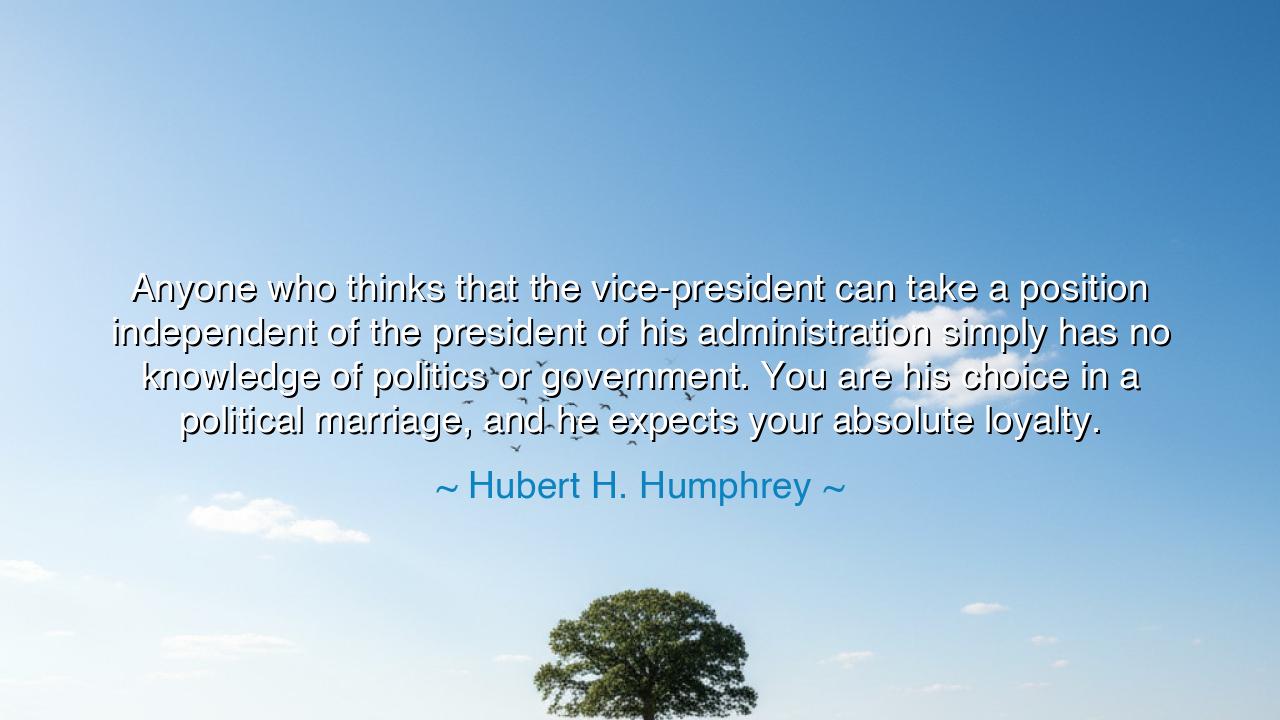
Anyone who thinks that the vice-president can take a position
Anyone who thinks that the vice-president can take a position independent of the president of his administration simply has no knowledge of politics or government. You are his choice in a political marriage, and he expects your absolute loyalty.






“Anyone who thinks that the vice-president can take a position independent of the president of his administration simply has no knowledge of politics or government. You are his choice in a political marriage, and he expects your absolute loyalty.” — Hubert H. Humphrey
Thus spoke Hubert H. Humphrey, a man who had walked in the shadow of the highest office, who had known the intoxicating nearness to power and the burdens it brings. His words carry the weight of experience — words not uttered from theory, but from the crucible of political reality. He reminds us that in the grand architecture of government, there is both majesty and bondage; that the vice-president, though adorned with honor, is bound by a vow invisible yet unbreakable — the vow of loyalty. For power, like marriage, requires unity of purpose, even when hearts may differ in secret.
Humphrey’s wisdom was forged in the fires of the Johnson administration, where he served as vice-president during an age of turmoil — the 1960s, when America trembled beneath the storms of war, protest, and change. He, a man of conscience and compassion, found himself serving a master of will and calculation: Lyndon B. Johnson. Between them existed the very “political marriage” of which Humphrey spoke — one of necessity, not affection. Johnson demanded not only service but surrender; he expected his vice-president to echo his every stance, to defend policies even when doubt gnawed at the soul. And Humphrey, bound by duty, learned what few ever understand: that loyalty in politics is both a virtue and a chain.
In this, Humphrey’s statement reveals a truth that transcends politics and touches the heart of leadership itself. Power, whether in a kingdom or a republic, can only survive through alignment — through the unity of its pillars. A house divided cannot stand, nor can a throne endure the whisper of dissent from within its court. Thus, the vice-president must mirror the president, just as the moon reflects the light of the sun. The moon may have its own face, its own substance, but in the realm of public light, it shines only by borrowed radiance. To the uninitiated, this may seem unjust; but to those who understand governance, it is the ancient law of stability.
Yet within this law lies tragedy — for such loyalty often demands the silencing of the self. Humphrey knew this sorrow. He had been a man of ideals, a champion of civil rights and peace. But as vice-president, he was compelled to defend the Vietnam War, a policy he privately questioned, yet publicly upheld in obedience to his role. His soul was torn between conscience and duty, between what he believed and what loyalty required. In the end, his silence cost him the trust of many and the peace of his own spirit. It was a lesson written in pain: that the price of proximity to power is often the sacrifice of independence.
The ancients would have understood this paradox well. In the courts of kings and emperors, there were always counselors and heirs who served at the pleasure of the sovereign — bound to obedience, though wisdom sometimes whispered otherwise. The loyal minister, the faithful general, the trusted vizier — all knew that to question the crown openly was to risk ruin, yet to follow blindly was to risk history’s judgment. This is the eternal balance of leadership: when to speak truth, and when to hold one’s tongue. Humphrey’s quote stands as a mirror to that ancient struggle, showing that even in the modern age, the politics of power remain as old as mankind itself.
What lesson, then, can we take from his words? It is this: that loyalty, though noble, must never be blind — but neither can leadership endure without it. In every partnership of power, from the halls of government to the smallest circle of life, there must be trust, alignment, and understanding. Yet the wise soul learns to preserve an inner integrity, a quiet compass that no master can command. For true service is not the denial of self, but the discipline of restraint, the ability to uphold unity without surrendering truth.
Let this truth be spoken to all who would lead or serve: Power binds as much as it elevates, and the closer one stands to its light, the deeper the shadow that follows. Serve loyally, but think freely. Honor your oaths, but guard your conscience. Know when to be the echo, and when to be the voice. For even within a political marriage, integrity must remain the secret vow of the soul.
In the end, Humphrey’s words remind us that leadership without loyalty is chaos, but loyalty without conscience is corruption. Between these two, wisdom must walk its narrow path — steady, humble, and aware that every alliance, no matter how powerful, is but a reflection of the greater duty we owe: not to a man, nor to a party, but to truth itself.






AAdministratorAdministrator
Welcome, honored guests. Please leave a comment, we will respond soon